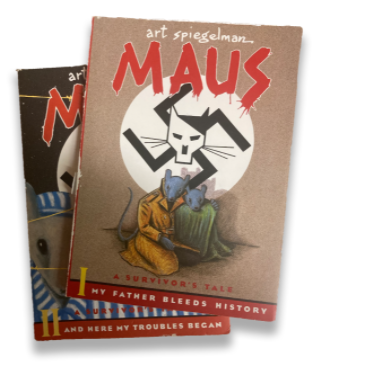
Censorship is one of modern society’s most insidious evils. While it’s usually thought of as black lines covering sensitive information or the prohibition of anti-government journalism, today’s censorship is more likely to be seen in banning books containing supposedly “inappropriate” or challenging content, especially in classrooms. The banning of “Maus,” Art Spiegelman’s graphic novel retelling of his father’s experience in the Holocaust by Tennessee’s McKinn County School Board is a recent and egregious example.
“Maus” has been globally hailed as one of the greatest Holocaust stories and graphic novels ever written, and was the first graphic novel to win a Pulitzer prize. Spiegelman uses the metaphorical devices of cats to represent Germans, mice to represent Jews and pigs to represent Poles. Most importantly, “Maus” illustrates the lived experiences of a Holocaust survivor.
Despite its accolades, the school board made the decision to ban the book based on the presence of a partially nude illustration depicting the author’s mother’s suicide, and eight uses of the swear words “hell” and “damn” (NPR). Although protests from the local Jewish community and advocates against censorship ensued, the book was deemed inappropriate in an eighth grade classroom.
The very wording of the ban is absurd. It is impossible to teach the Holocaust without being “innapropriate.” Six million Jews were systematically tortured and murdered, including children and the elderly, and a fascist regime gained control of much of Europe. These events, if taught accurately, will never be easy or fun to learn about. It is expected for students to be uncomfortable and even required to understand the full scope of this tragedy. Any attempt to water down these stories or make them “appropriate” dishonors the memories and experiences of survivors.
The school board appears to have the right intentions as they are requiring Holocaust education in middle school classrooms. But they are set on fitting this education neatly into their belief system. Many support their decision, and believe that there are better ways to represent the Holocaust than the controversial and graphic “Maus.” McKinn County board member Tony Allmen agrees, as he said, “It’s like when you’re watching tv and a cuss word or nude scene comes on it would be the same movie without it. Well, this would be the same book without it….” (The Jewish Chronicle).
The key difference is that “Maus” is not a fictional story, and its facts cannot always conform to current American cultural norms or beliefs. The author’s mother did in fact die by suicide and swear words were used as the Jewish family faced unimaginable circumstances. As Spiegelman states in reference to one of these instances, “I guess it would’ve been better, for the school board, to say, ‘Gee whiz, Pop — I wish you hadn’t done it!’ But that would not have been accurate to my intensity of horror” (The Jewish Chronicle). Removing or changing any part of the story is equivalent to writing over the voices of the author and the Jewish people, who should be central to any Holocaust dialogue.
The banning of “Maus” establishes a dangerous precedent of sterilizing history for easier public consumption. As Spiegelman states, “This is about othering and what’s going on now is about controlling … what kids can look at, what kids can read, what kids can see in a way that makes them less able to think, not more” (Rolling Stone). If children are raised with censorship of content they learn in classrooms, they may develop an ignorance of minorities or those who have suffered oppression. There then may be no hope for the prevention of these horrible events from occurring again.
